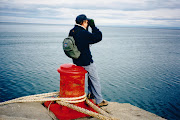
"Moki" is a Hopi word for "those who are gone," or "the people who have left." A winding, gravel road that contracts into three miles of hairpin turns cutting deep into the sides of a mesa above Valley of the Gods, Utah, is called the Moki Dugway. Parking at the top to look down into the Valley with its red buttes and eerie hoodoos, I met Dale, from Eastern Oregon.
I told him he seemed to be a long way from home; but no, it turned out he wasn't at all.
As a boy he had lived in a remote corner of Utah called Granite Canyon, and he'd come back many times, he told me, to visit what was left of his family's old homestead. This time he'd brought his wife, Patsy, with him, and his dog, named Bo. All three of them were comfortably retired--Bo napped at our feet as we clutched our sunglasses in the stiff wind above the dugway--and all had recently moved to Oregon to be nearer Dale and Patsy's children. But their hearts were still embedded in red rock.
Granite Canyon was so remote, Dale told me, that in the 1920's it had been a day's ride on horseback into tiny Cisco just to get the mail (Cisco isn't much more than a ghost town even now--I've seen it, and if people are living there, they don't want you to know about it). His mother had met his father getting the mail in this way, as they both crossed the Dewey Bridge at roughly the halfway point. They soon married and settled down in the Canyon to raise their children and cattle. Each time one of Dale's siblings had been about to burst into the world, his pregnant mother had mounted her horse, riding toward Cisco in hopes of catching the train in time to reach Grand Junction, Colorado, and the doctor. Usually, though, she didn't get close.
"In my case, she didn't," Dale grinned. "I was born in Utah."
It was a perfect life for all of them, tucked away in the hidden canyon, he said; but it all began to unravel with the passing of the Grazing Act. Soon "sheepmen," as he called them--I was fairly certain he wanted to spit the two thousand feet down to the Valley floor as he said the word, but was too much a gentleman in his nice clean windbreaker to do it--intruded themselves on the scene. The sheepmen weren't so gentlemanly, and they dynamited the passes that Dale's family used to bring their cattle down from the mountains and into the grazing fields. The ranch couldn't survive this and other explosions of the time, so the family at last gave up, sold out and left.
"After a long time," Dale said, reaching down and patting Bo, "I was finally able to bring myself to go back." All that remained was the chimney of the main house, and the ruins of the old root cellar.
"But the cabins in the mountains that we used to have for our summer camp were still standing, and the local people there still call them by our family's name. They're still called the Wood Cabins. I mean it. If you go there, you can see for yourself."
"So . . . this was definitely worth the climb to get up here, wasn't it?" he straightened and turned to Patsy, and then looked down.
"Yep. We definitely don't have anything like this in Oregon."
"Why our children would want to live in Portland is way beyond us. We won't, will we, Patsy? Not enough sun."
I asked him if the rest of his family had been back to see the old place.
"Oh, yeah. I took my brother there and showed him, and his face just lit up. Just lit up. At nothing but the chimney and the root cellar. Nothing much at all. But it was special. Just to be able to show him that we were still standing." And Dale stood and balanced and looked out over the twists and turns of the blasted pass below us, named for those long vanished.
--MD













No comments:
Post a Comment